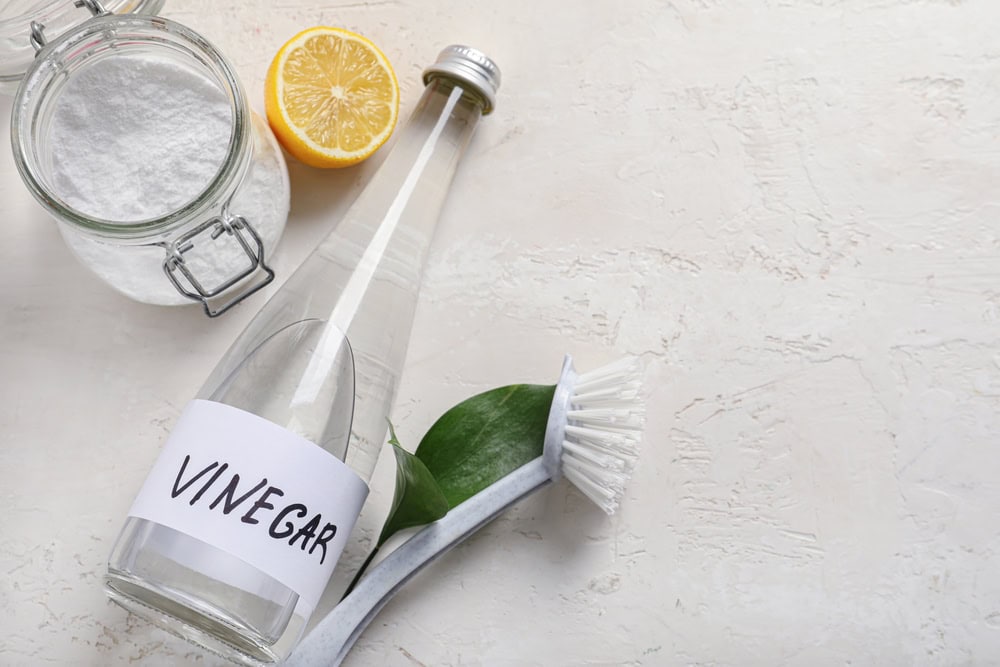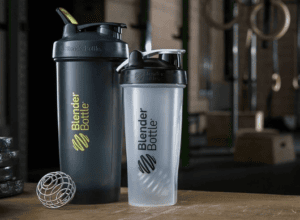Everyday Cleaning Uses for Vinegar
-
 By
Ava Thompson
By
Ava Thompson

Did you know that white vinegar is a versatile cleaner? In this guide, we’ll be going over how you can use it to tackle grime, odors, and stains throughout your home. Keep reading to learn more.
Table of Contents
ToggleUnderstanding Vinegar as a Cleaning Agent
Vinegar is more than just a kitchen staple; it’s a powerhouse when it comes to cleaning. Its secret lies in acetic acid, an ingredient in vinegar that is effective at cutting through mildew, bacteria, and grime, making it safe for various surfaces.
This disinfectant is also incredibly affordable, costing just 5 cents an ounce, which makes it a budget-friendly alternative to chemical cleaners.

It’s also incredibly versatile. From degreasing your range hood to descaling your coffee maker, vinegar can do it all. It’s also excellent at removing soap scum, grease, grime, and limescale deposits. Just remember to test undiluted vinegar in an inconspicuous area first to prevent damage to sensitive surfaces.
While vinegar works wonders on most surfaces, there are some exceptions. For example, you should avoid using it on natural stone surfaces like granite or marble as it can cause etching.
Types of Vinegar for Cleaning
When it comes to cleaning, not all types of vinegar are created equal. White distilled vinegar, containing 5 percent acetic acid, is the best choice due to its clear appearance and neutral smell.
Cleaning vinegar on the other hand, with its higher acidity (6 percent), is often preferred for tougher cleaning jobs. This undiluted cleaning vinegar can break down stubborn stains and mineral deposits more effectively, making it ideal for deep cleaning projects. Just remember to handle it with care due to its stronger acidic nature.
While apple cider vinegar can also be used for cleaning, it is generally less effective than white vinegar. Its darker color and stronger smell can also make it less desirable for household cleaning tasks.
How to Prepare Vinegar Cleaning Solutions
Creating a cleaning solution with vinegar is straightforward and can be customized for various needs.
Making an All-Purpose Cleaner
You can create an all-purpose cleaner by mixing white vinegar with a few household items.
Step 1: Combine Vinegar and Water

Mix one part vinegar with one part water in a spray bottle. This solution can be used on counter tops, windows, and even as a floor cleaner.
Step 2: Add Some Dish Soap

For extra cleaning power, you can add 1/2 teaspoon of dish soap. The resulting solution will effectively cut through grease and grime in the kitchen and bathroom.
Step 3: Add Borax

For those looking to go the extra mile, you can create an enhanced all-purpose cleaning by adding a couple teaspoons of borax.
Supply:
- White vinegar
- Water
- Dish soap
- Borx
- Spray bottle
Make sure the solution is thoroughly combined before using.
Scented Vinegar Cleaner
Scented vinegar cleaners are the way to go if you’re not a fan of the vinegar smell.
Supplies:
- White vinegar
- Lemon or orange peels
- Mason jar
Step 1:
Fill a Mason jar with lemon peels. Orange peels can also work.

Step 2:
Pour white vinegar into the jar so the peels are completely submerged, then secure the lid.
Set the jar aside and let the peels infuse for 2-3 weeks.

You can also add fresh pine twigs for a herbal aroma.
Cleaning the Kitchen with Vinegar
Vinegar can work wonders in the kitchen. For example, you can use it to clean counter tops as well as tools such as cutting boards.
Supplies:
- White vinegar
- Water
- Clean cloth
- Paper towels

Step 1:
Combine equal parts of white vinegar and water in a small bowl.

Step 2:
Dampen a clean cloth with the vinegar solution and use it to wipe the kitchen surface.
Not only will the vinegar cut through grease and grime but it’ll also eliminate odors.

Step 3:
After cleaning, wipe the surface dry with a clean paper towel.
You can also use white vinegar to clean appliances such as coffee makers and kettles.
Cleaning the Bathroom with Vinegar
Distilled white vinegar is highly effective for bathroom cleaning. For example, you can use it to remove soap scum from the sink and other surfaces.
Removing Soap Scum
Vinegar can be used to remove soap scum from tile, shower glass, and other surfaces.
Supplies:
- White vinegar
- Water
- Spray bottle
- Soft bristle brush
Step 1:
Mix one cup of vinegar with a quart of water in a spray bottle.

Step 2:
Give the bottle a good shake and apply it to the affected area. Let it sit for 15- 20 minutes.

Step 3:
Gently scrub the area with a soft bristle brush to loosen the soap scum then rinse with water.

Heavier soap scum deposits may require a stronger vinegar mixture or repeat applications.
Clearing Clogged Drains
Vinegar can also be used to clear clogged drains if you combine it with baking soda.
Supplies:
- White vinegar
- Baking soda
- Hot water

Step 1:
Pour four cups of hot water, followed by one cup of baking soda and one cup of cleaning vinegar. It’ll start to bubble up as the ingredients react.

Step 2:
Flush the drain with hot water.
Laundry Tips Using Vinegar
Using white vinegar in the laundry room can extend the life of your fabrics, making them softer and more comfortable to wear. Not only that but it will also remove detergent residue, protect colors, and leave your clothes fresh.
Supplies:
- White vinegar
Step 1:
Use laundry detergent and run a wash cycle as normal. For the best results, choose the hottest temperature setting.

Step 2:
Pause the washer before the final rinse cycle and pour one cup of white vinegar directly to the drum.

Step 3:
Resume the washing cycle.

Floor Cleaning Techniques with Vinegar
You can also clean the floors with white vinegar. Not only will it cut through dirt and grease but it’ll also act as a mild disinfectant.
Supplies:
- Wate
- White vinegar
- Bucket

Step 1:
In a large bucket, mix one gallon of water with 1/2 cup of cleaning vinegar to create a general floor cleaning solution.

Step 2:
Dampen a mop with the vinegar solution and use it to clean the floor – one small section at a time.

Step 3:
Rinse the mop head regularly with water as you continue to clean the floor.
Avoid using vinegar on granite, marble, or waxed finishes, as it can scratch or degrade these surfaces.
Removing Carpet Stains With Vinegar
White vinegar can also be used to tackle carpet stains.
Supplies:
- Liquid dish soap
- White vinegar
- Warm water
- Spray bottle
- Damp cloth
Step 1:
Mix one teaspoon of mild dish soap with 1/4 teaspoon of white vinegar in a spray bottle, then add one quart of warm water.

Step 2:
Spray the vinegar solution directly onto the carpet stain and let it sit for 15-20 minutes.

Step 3:
Rinse the treated area by blotting with a damp cloth.

For tougher stains, you may need to add a bit of baking soda.
Safety Tips When Using Vinegar
While vinegar is a non-toxic and eco-friendly cleaner, there are some safety tips to keep in mind. For one thing, you should never mix vinegar with bleach or hydrogen peroxide as it can create toxic fumes. The same goes for ammonia.

Also, avoid using vinegar on porous surfaces like granite or marble to prevent damage. And when handling undiluted vinegar, always wear rubber gloves to protect your skin and do so in a well-ventilated area to minimize the inhalation of fumes.
Knowing How to Clean With Vinegar
Vinegar is an incredibly versatile and effective natural cleaner for your home. Whether you’re tackling kitchen grime, bathroom mold, or laundry freshness, vinegar can handle it all.
By understanding the different types of vinegar and how to prepare the various cleaning solutions, you will be able to maintain a pristine home without relying on harsh chemical cleaners.
Key Takeaways
- Vinegar is an affordable and versatile cleaning agent that effectively tackles grime and mildew
- White distilled vinegar and cleaning vinegar are the best options for cleaning tasks; apple cider vinegar is less effective
- You can create an effective all-purpose cleaner by mixing vinegar with water
- You can make the scent of the vinegar solution more pleasant by adding essential oils
Frequently Asked Questions
Can I use vinegar on all surfaces?
Avoid using vinegar on natural stone surfaces like granite or marble, as it can cause damage.
How do I make a scented vinegar cleaner?
You can make a scented vinegar cleaner by adding essential oils. Alternatively, you can add citrus peels or herbs to the vinegar and let it infuse for a few weeks.
Is vinegar safe for hardwood floors?
Yes, vinegar is safe for sealed or prefabricated hardwood floors. Just remember to use a damp mop instead of a soaked mop.
Can vinegar replace my regular laundry detergent?
Vinegar is great as a booster and fabric softener, but it shouldn’t take the place of your regular laundry detergent completely. For the best results, stick with both.
What precautions should I take when using white vinegar?
Never mix vinegar with bleach or ammonia as it can lead to the production of toxic fumes. Also, make sure to use it in a well-ventilated area while wearing gloves.
SAVE
15% off
Your Next ACTIVE
Purchase on Amazon
15% Off Your Order on Amazon
×Click below to reveal the 15% off coupon for your entire ACTIVE purchase on Amazon.com
Limited Time Offer




